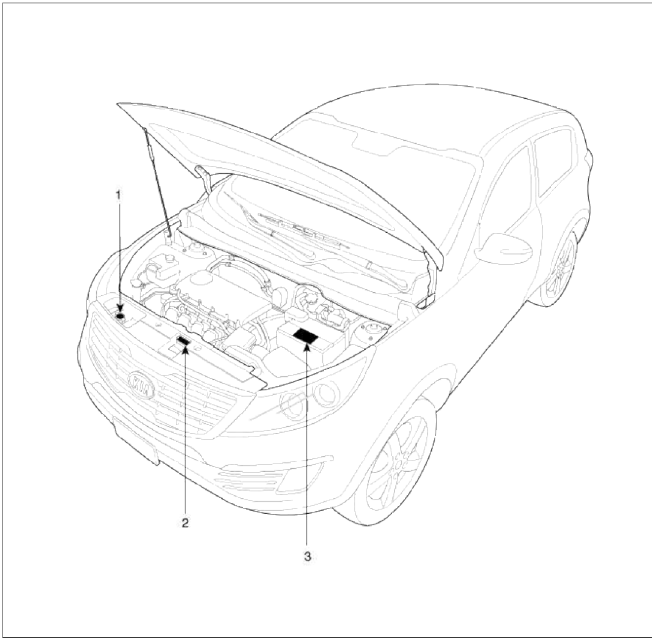Kia Sportage: Warning / Caution Label Locations

- Radiator cap caution
- Fan caution
- Battery caution
Battery Caution Label Description

Warning / Caution Label (Cont'd)
- Keep flames or sparks away from the battery.
- Wear eye protection when charging or working near a battery. Always
provide ventilation when working in an
enclosed space.
- When lifting a plastic-cased battery, excessive pressure on acid to leak resulting in personal injury. Lift with a battery carrier or with your hands on opposite corners.
- Never attempt to change the battery when the battery cables are connected.
- The electrical ignition system works with high voltage.
Never touch these components with the engine running or the ignition switched on.
- Keep batteries out of the reach of children because batteries contain highly corrosive SULFURIC ACID. Do not allow battery acid to contact your skirt, eyes, clothing or paint finish.
- If any electrolyte gets into your eyes, flush your eyes with clean water
for at least 15 minutes and get immediate
medical attention. If possible, continue to apply water with a sponge or
cloth until medical attention is received.
If electrolyte gets on your skin, thoroughly wash the contacted area. If you feel a pain or a binning sensation, get medical attention immediately.
- Always read the following instructions carefully when handing a battery.
- Hydrogen, which is a highly combustible gas, is always presents in battery cells and may explode if ignited.
- An improperly disposed battery can be harmful to the environment and
human health.
Always confirm local regulations for battery disposal.
Handling And Storage The Battery
Battery Itself
- Batteries should be stored in cool, dry (27ºC / 80.6ºF) places and out of direct sunlight.
- MF batteries are tightly sealed to prevent acid leakage.
However, tilting the battery to an angle of 45 degrees can cause acid to leak through the vents on the sides. Therefore, batteries should always be stored in their upright positions. Prevent placing any aqueous or solid (i.e. conductors) bodies on top of the battery.
- It is extremely dangerous to use tools, such as hammers, on the battery terminals when connecting cables to the mounted battery.
Battery on Vehicle
- When storing the vehicle for long periods of time, make sure to remove the memory fuse at junction box to prevent natural discharging.
- Also, run the engine for battery charging within 1 month if the memory
fuse
wasn't removed from the start of vehicle storing.
If the memory fuse was removed, run the engine for battery charging within 3 months from the start of vehicle storing.
NOTE
After reconnecting or recharging a discharged battery, the ESC OFF indicator may illuminate.
In this case, turn the handle half way to the left and right whilst the ignition switch is in the ON position.
Then, restart the engine after the ignition is OFF.
The ESC OFF indicator may turn OFF.
If the ESC OFF indicator does not turn OFF, have the system checked referring to DTC.
Lift And Support Points
WARNING
When heavy rear components such as suspension, fuel tank, spare tire, tailgate and trunk lid are to be removed, place additional weight in the luggage area before hoisting. When substantial weight is removed from the rear of the vehicle, the center of gravity may change and can cause the vehicle to tip forward on the hoist.
NOTE
- Since each tire/wheel assembly weights approximately 14kg (30lbs), placing the front wheels in the luggage area can assist with the weight distribution.
- Use the same support points to support the vehicle on safety stands.
1. Place the lift blocks under the support points as shown in the illustration.
2. Raise the hoist a few inches (centimeters) and rock the vehicle to be sure it is firmly supported.
З. Raise the hoist to full height to inspect the lift points for secure support.

READ NEXT:
 Towing
Towing
If the vehicle needs to be towed, call a professional towing service. Never
tow vehicle with just a rope or chain. It is
very dangerous.
Emergency Towing
There are three popular methods of to
 Meaning Of Symbols
Meaning Of Symbols
There are five primary symbols used to complement illustrations. These
symbols indicate the part to apply such
materials during service.
Do not reuse the part. Replace a new one.
Apply engi
 General Service Information
General Service Information
Protection Of The Vehicle
Always be sure to cover fenders, seats, and floor areas before starting work.
CAUTION
The support rod must be inserted into the hole near the edge of the hood
whenever y
SEE MORE:
 Temperature control
Temperature control
The temperature control knob allows
you to control the temperature of the air
flowing from the ventilation system.
To change the air temperature in the
passenger compartment, turn the knob
to the right for warm and hot air or to
the left for cooler air.
NOTICE
When starting the vehicle i
 Owner maintenance
Owner maintenance
The following lists are vehicle checks
and inspections that should be performed
by the owner or an authorized
Kia dealer at the frequencies indicated
to help ensure safe, dependable operation
of your vehicle.
Any adverse conditions should be
brought to the attention of your dealer
as soon
Content
- Home
- Kia Sportage - Fifth generation (NQ5) - (2022-2025) - Owner's Manual
- Kia Sportage - Second generation (JEKM) (2005-2015) - Body Workshop Manual
- Kia Sportage Third generation (SL) - (2011-2016) - Service and Repair Manual
- Sitemap
- Top articles